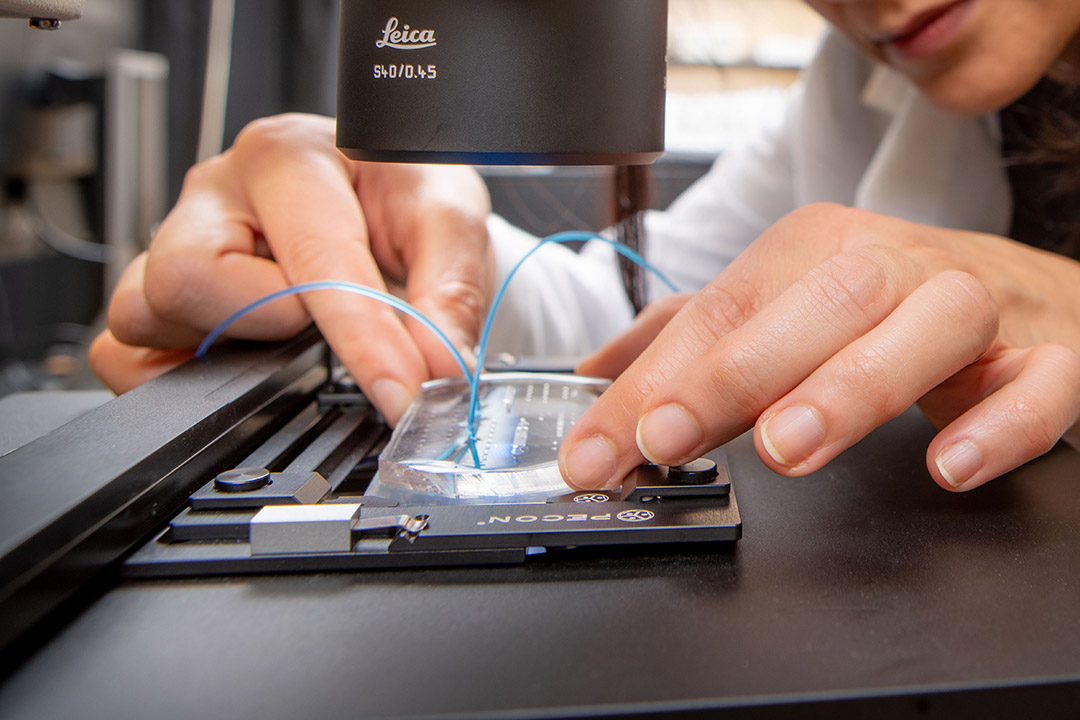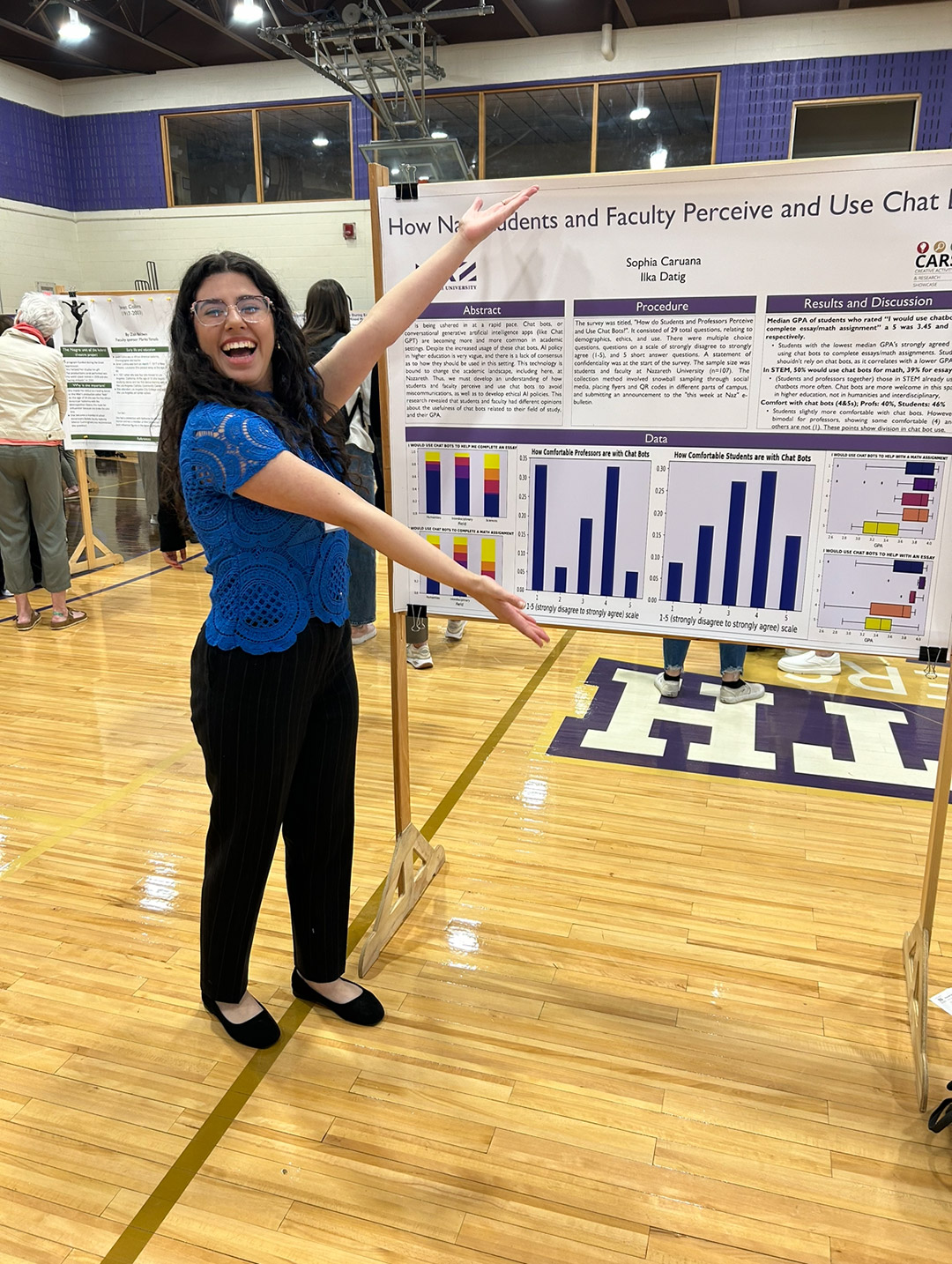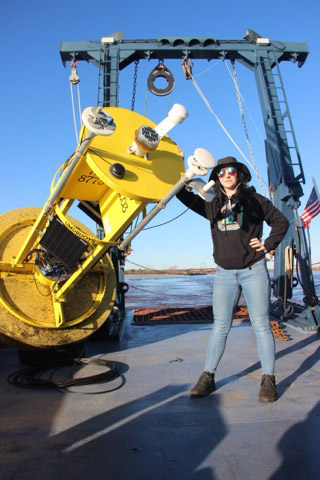New Ph.D. programs welcome students this fall
RIT now offers doctoral programs in cognitive science and physics
Scott Hamilton
RIT is beginning two new doctoral programs in cognitive science and physics. Both programs offer diverse research opportunities, including soft matter physics research.
Sophia Caruana was seeking an interdisciplinary doctoral program where she could pursue her interests in data ethics, AI, and human-centered computing. Kaitlin Boedigheimer was interested in exploring possible research opportunities in soft-matter physics.
Both of them found their niche within two of RIT’s newest Ph.D. programs: cognitive science and physics.
The cognitive science Ph.D. program is jointly delivered by faculty experts from six colleges within the university: College of Liberal Arts; College of Science; Golisano College of Computing and Information Sciences; Kate Gleason College of Engineering; College of Engineering Technology; and National Technical Institute for the Deaf. The physics Ph.D. is offered by the College of Science.
An interdisciplinary approach to cognitive science
RIT’s cognitive science Ph.D. program provides an interdisciplinary study of the human mind that combines insights from psychology, computer science, linguistics, neuroscience, augmented reality, and philosophy. Students will gain the skills and abilities needed to analyze data, grasp complex concepts, and interpret and communicate concepts for a wider audience.
Matt Dye, professor and director of the cognitive science program and NTID’s Sensory, Perceptual, and Cognitive Ecology (SPACE) Center, explains that the joint offering between the six colleges is a unique asset for graduate students.
“Cognitive science itself is inherently interdisciplinary. It requires this kind of marriage of liberal arts, engineering, and technical thinking,” said Dye. “One of the advantages we have at RIT is that students can learn from experts from across six different colleges, so they can acquire a range of skills and abilities that they might not get at other universities.”
The multidisciplinary approach means students from all undergraduate backgrounds can apply for the program, provided it matches their academic and career interests. Four students were accepted into the program this year.
Provided
Sophia Caruana said she has a deep interest in interdisciplinary research and education, which made RIT’s cognitive science doctoral program a perfect fit for her. Here, she presents a previous research project, “How faculty and students at Nazareth University perceive and use chat bots.”
Caruana, from Rochester, N.Y., graduated this past May from Nazareth University with a bachelor’s degree in ethical data science and minors in psychology, philosophy, and math. When she made the decision to pursue her Ph.D., she wanted to find an interdisciplinary program that would work well with her current expertise.
In 2023, she met with Professor Cecilia Alm, who would become her Ph.D. faculty advisor at RIT, to learn more about Alm’s Computational Linguistics and Speech Processing (CLASP) lab. That meeting was the final push Caruana needed to apply to RIT.
“Professor Alm explained that my role in her lab as a cognitive science student would focus on using biologically-inspired systems to model human emotions with artificial intelligence. The questions surrounding that are really intriguing, and something I was already thinking about with my own research,” said Caruana. “I think the work in the CLASP lab is going to be monumental for ethical, human-centered AI, and I knew I wanted to be a part of it.”
Steadily growing opportunities in physics
Boedigheimer earned her bachelor’s degree in physics from University of Minnesota – Twin Cities and her master’s degree in physics from University of Minnesota – Duluth. But she realized there were more job opportunities in her field for Ph.D’s. Once she heard about RIT Professor Shima Parsa’s soft matter research at a colloquium, her interest in RIT was piqued. After she visited the campus in March, she was convinced.
Provided
Kaitlin Boedigheimer believes she’ll have better job prospects with a Ph.D. in physics. She will be researching the filtration methods of nanoplastics to expand her interest in soft matter physics.
“The state-of-the-art technology here really impressed me,” said Boedigheimer.
She is one of seven students in the first class of physics Ph.D. students at RIT. The program offers a wide array of research areas including atomic/molecular/optical physics, multi-messenger astrophysics, photonics and the next quantum revolution, and physics for sustainable/renewable energy. Boedigheimer will be focusing on the filtration methods of nanoplastics, working closely with Parsa.
The new physics program had nearly 120 applicants in its first year. The recently announced National Science Foundation Research Traineeship Program (NRT) gives RIT the resources to grow the program by a few students each year in the future.
“Since the NRT is a highly prestigious fellowship, this allows us to actively recruit the very best and brightest graduate students into our new Ph.D. program,” said Seth Hubbard, program director and professor in the School of Physics and Astronomy.
These two new programs bring RIT’s total doctoral programs to 13. RIT’s other programs include astrophysical sciences and technology, biomedical and chemical engineering, business administration, color science, computing and information sciences, electrical and computer engineering, imaging science, mechanical and industrial engineering, microsystems engineering, mathematical modeling, and sustainability.
RIT’s priority in building doctoral research programs is integral to the university’s future. These programs attract top-tier faculty who generate research funding and support teams of graduate student researchers. In turn, the faculty and research opportunities recruit Ph.D. students to the university.
More information is available on the cognitive science doctoral program website, or by emailing Matt Dye at mwddls@rit.edu.
Go to the physics Ph.D. program website for more information.












